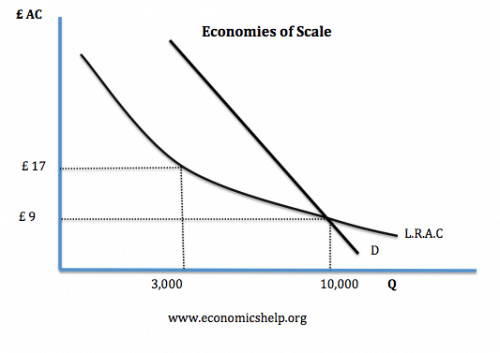Definition: A natural monopoly occurs when the most efficient number of firms in the industry is one.
A natural monopoly will typically have very high fixed costs meaning that it is impractical to have more than one firm producing the good.
An example of a natural monopoly is tap water. It makes sense to have just one company providing a network of water pipes and sewers because there are very high capital costs involved in setting up a national network of pipes and sewage systems. To have two different companies offering water wouldn’t make sense as the average cost would be very high compared to just one firm and one network. There would also be the inconvenience of having two firms dig up the road to lay a duplicate set of water pipes.
Definition of Natural Monopoly
William Baumol (1977) stated a natural monopoly is
“[a]n industry in which multiform production is more costly than production by a monopoly”
Diagram of Natural monopoly

- Suppose the industry demand is 10,000 units.
- If a firm produces 10,000 units, it will get the lowest possible average costs – £9.
- If there were three firms producing 3,000 units. The firms would have average costs of £17.
- Therefore, the optimal number of firms in the industry will be one (one firm producing all 10,000 units)
Examples of Natural Monopolies
- Gas network
- Electricity grid
- Railway infrastructure
- National fibre-optic broadband network.
Examples of potential natural monopolies
- Aeroplane manufacture – At the moment, this is a duopoly so it is not a natural monopoly, but it is close. There are very high fixed costs associated with aeroplane manufacturing, but with the global industry, two main producers can be supported.
- Digital platforms. In some cities, a product like Uber becomes ubiquitous for that segment of private taxi hire via an app. The fixed costs are not particularly high, but the dominant firm benefits from network economies, improved information, lower average prices and
- Bus services in one particular region. – The most logical number of bus companies within a town is one. There are high fixed costs, but more importantly issues of practicality. Even on a busy route between two towns, it might be inefficient to have two bus companies competing over the same route and offering the same peak and off-peak services. One company can avoid:
- Duplication of services
- Congestion at peak times
- Too much supply at off-peak times
However, some cities do have multiple bus services. On the one hand, this is more competition, but on the other hand, there is duplication.
Note: In buying gas for domestic use, there is competition. There are several companies who use the one national network. Therefore, gas is a natural monopoly at the distribution stage, but at the retail stage, it is possible to have competition.
Regulation of Natural Monopolies
Natural monopolies are uncontestable and firms have no real competition. Therefore, without government intervention, they could abuse their market power and set higher prices. Therefore, natural monopolies often need government regulation. For example, OFWAT and OFGEM regulate the water and energy markets respectively.
more on Regulation of monopolies
Related
